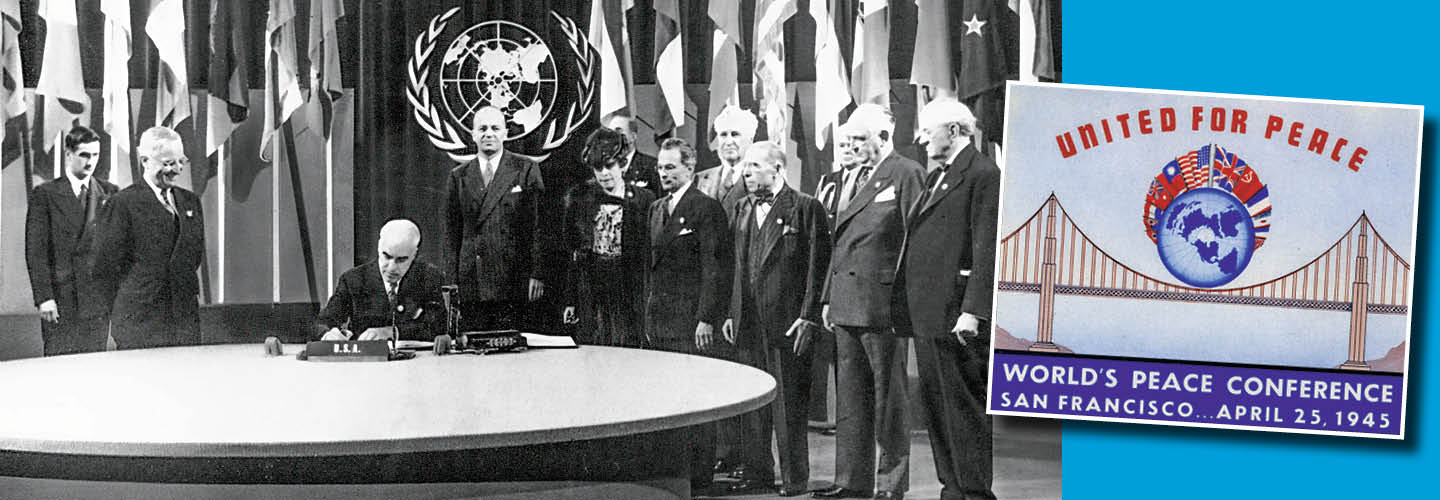For two months in the spring of 1945—as Soviet forces closed in on Adolf Hitler’s Berlin bunker before Germany’s eventual surrender in World War II—delegates from 50 nations gathered at San Francisco’s opera house. By day, they debated whether certain nations should hold more power on the global stage than others. By night, they mingled at swanky cocktail parties and dinners hosted by various delegations. Their goal? To ensure that the horrors of the still-raging war, which would kill more than 70 million people, would never happen again.
“If we do not want to die together in war, we must learn to live together in peace,” President Harry S. Truman urged the conference on its opening day. It was his predecessor, President Franklin D. Roosevelt, who had envisioned a “United Nations” headed by “four policemen” who would maintain order in the postwar world: eventual World War II victors Britain, the United States, the Soviet Union, and China. France became the fifth after it was liberated from Nazi rule. But when Roosevelt died suddenly, less than two weeks before the conference began, the newly sworn-in President Truman picked up the mantle.
From April 25 to June 26, 1945, 850 delegates met in San Francisco to realize Roosevelt’s vision. Whatever their doubts and disagreements, they managed to hammer out a charter, 80 years ago this summer, establishing the purpose and structure of the United Nations (U.N.). In the ensuing decades, the U.N., from its flag-adorned headquarters in New York City, has attempted—with mixed results—to keep the peace when violence erupts around the world. But it’s also fed hundreds of millions of people in conflict and disaster zones, administered millions of vaccines against deadly diseases, and helped resettle hundreds of thousands of refugees.
“Throughout its history, the United Nations has never fulfilled the hopes of its founders, but it accomplished a good deal nevertheless,” says Stanley Meisler, author of United Nations: A History. “While taking part in some of the most tumultuous events” of its time, “the United Nations served the world nobly and well.”
In the spring of 1945, Soviet forces were approaching Adolf Hitler’s Berlin bunker before Germany’s eventual surrender in World War II. At the same time, delegates from 50 nations met at San Francisco’s opera house for two months. They debated whether certain nations should hold more power than others. After the daily meetings, they attended fancy cocktail parties and dinners hosted by various delegations. Their goal was to make sure that the horrors of the still-raging war would never happen again. (More than 70 million people were killed during World War II.)
“If we do not want to die together in war, we must learn to live together in peace,” President Harry S. Truman urged the conference on its opening day. It was his predecessor, President Franklin D. Roosevelt, who had thought of a “United Nations” headed by “four policemen” who would maintain order in the postwar world. The World War II victors Britain, the United States, the Soviet Union, and China would serve as the “four policemen.” France became the fifth after it was freed from Nazi rule. President Roosevelt suddenly died less than two weeks before the conference began. Newly sworn-in President Truman championed the idea.
From April 25 to June 26, 1945, 850 delegates met in San Francisco to realize Roosevelt’s vision. Whatever their doubts and disagreements, they managed to hammer out a charter. The purpose and structure of the United Nations (U.N.) was created 80 years ago this summer. In the following decades, the U.N., located in New York City, has tried—with mixed results— to keep the peace around the world. But it also has other functions. The U.N. has fed hundreds of millions of people in conflict and disaster zones, administered millions of vaccines against deadly diseases, and helped resettle hundreds of thousands of refugees.
“Throughout its history, the United Nations has never fulfilled the hopes of its founders, but it accomplished a good deal nevertheless,” says Stanley Meisler, author of United Nations: A History. “While taking part in some of the most tumultuous events” of its time, “the United Nations served the world nobly and well.”

